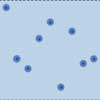Press / Other scientists & discussion
Submitted by david on Sun, 28/12/2008 - 5:27pm
Suppose that every time there is an opportunity for an event to happen, then it occurs with unknown probability [math]p[/math]. Laplace's law of succession states that, if before we observed any events we thought all values of [math]p [/math] were equally likely, then after observing [math]r[/math] events out of [math]n[/math] opportunities a good estimate of [math]p[/math] is [math]\hat{p} = (r+1)/(n+2)[/math].
Submitted by david on Wed, 18/06/2008 - 2:49pm
getting life expectancy from life tables.
Submitted by david on Wed, 09/04/2008 - 4:37pm
In What are the chances? we saw how the chance of a rare event occurring could be calculated for specific problems.
Submitted by david on Tue, 05/02/2008 - 10:51am
Suppose there are $aN$ lottery tickets sold, each with a chance $1/N$ of winning.
Submitted by david on Tue, 05/02/2008 - 10:29am
In Pick a Number - Level 2 we calculated the probability of a group of 20 people all picking different numbers between 1 and 100. Here we derive a general algebraic approximation.
Submitted by david on Mon, 03/12/2007 - 11:47am
Luck or skill? suggested using the average number of points per match as an estimate of an underlying quality measure, leading to confidence intervals and uncertainties about ranks. Here we discuss a simple mathematical model that gave rise to those results.
Submitted by david on Wed, 07/11/2007 - 5:28pm
 In Lottery Expectations we looked at the observed and theoretical distributions for the total count of times each number has come up, and the gap between a number's appearances. Here we explain the mathematics behind the theoretical distribution of counts, and how to check for true randomness, and derive the theoretical distribution for gaps.
In Lottery Expectations we looked at the observed and theoretical distributions for the total count of times each number has come up, and the gap between a number's appearances. Here we explain the mathematics behind the theoretical distribution of counts, and how to check for true randomness, and derive the theoretical distribution for gaps.
